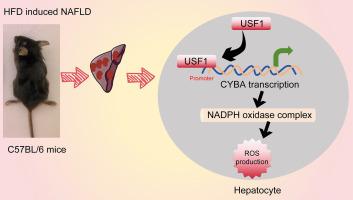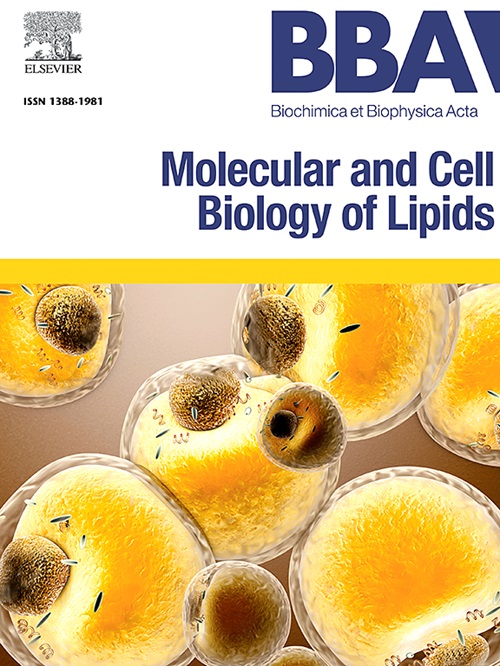USF1 在非酒精性脂肪肝中激活 CYBA 转录并影响 NADPH-ROS 介导的氧化应激和脂质积累的作用。
IF 3.9
2区 生物学
Q2 BIOCHEMISTRY & MOLECULAR BIOLOGY
Biochimica et biophysica acta. Molecular and cell biology of lipids
Pub Date : 2024-11-20
DOI:10.1016/j.bbalip.2024.159581
引用次数: 0
摘要
非酒精性脂肪肝(NAFLD)的进展与氧化应激有关,而 NADPH 氧化酶可产生 ROS。本研究探讨了上游刺激因子1(USF1)如何通过NADPH-ROS途径调控细胞色素b-245α链(CYBA)的表达及其对非酒精性脂肪肝中氧化应激和脂质积累的影响。生物信息学分析发现,CYBA是非酒精性脂肪肝中表达发生改变的基因。通过高脂饮食(HFD)和棕榈酸(PA)处理,分别建立了非酒精性脂肪肝的小鼠和细胞模型。利用 RNA 干扰调节 CYBA 和 USF1 的表达,然后研究它们对非酒精性脂肪肝进展的影响。为了证实 USF1 对 CYBA 的转录调控,进行了 ChIP 和双荧光素酶报告实验。在非酒精性脂肪肝中观察到 CYBA 表达升高。在非酒精性脂肪肝模型中,敲除CYBA后可观察到NADPH氧化酶活性降低、氧化应激、脂质积累和炎症反应。研究发现 USF1 与 CYBA 启动子结合并激活其转录。敲除 USF1 对非酒精性脂肪肝的影响与敲除 CYBA 相似。过表达 CYBA 可逆转 USF1 沉默对非酒精性脂肪肝的保护作用。总之,本研究证明 USF1 介导了 CYBA 的转录激活,增加了非酒精性脂肪肝中 NADPH-ROS 衍生的氧化应激和脂质积累。本文章由计算机程序翻译,如有差异,请以英文原文为准。

Role of USF1 in activating CYBA transcription and influencing NADPH-ROS-mediated oxidative stress and lipid accumulation in non-alcoholic fatty liver disease
Nonalcoholic fatty liver disease (NAFLD) progression is relevant to oxidative stress, while NADPH oxidase can produce ROS. This study explored how the upstream stimulatory factor 1 (USF1) regulates cytochrome b-245 alpha chain (CYBA) expression through the NADPH-ROS pathway and its impact on oxidative stress and lipid accumulation in NAFLD. Bioinformatics analysis identified CYBA as a gene with altered expression in NAFLD. Mouse and cell models of NAFLD were established through high-fat diet (HFD) and palmitic acid (PA) treatment respectively. CYBA and USF1 expression was modulated using RNA interference, and their effects on NAFLD progression were then examined. ChIP and dual-luciferase reporter assays were performed to confirm the transcriptional regulation of CYBA by USF1. Elevated CYBA expression was observed in NAFLD. Reduced NADPH oxidase activity, oxidative stress, lipid accumulation, and inflammation were observed in NAFLD models after knocking down CYBA. USF1 was found to bind to the CYBA promoter and activate its transcription. Similar effects as CYBA knockdown on NAFLD were achieved by knocking down USF1. The protective impacts of USF1 silencing on NAFLD were reversed by overexpressing CYBA. In summary, this study demonstrates that USF1 mediates the transcriptional activation of CYBA, increasing NADPH-ROS-derived oxidative stress and lipid accumulation in NAFLD.
求助全文
通过发布文献求助,成功后即可免费获取论文全文。
去求助
来源期刊
CiteScore
11.00
自引率
2.10%
发文量
109
审稿时长
53 days
期刊介绍:
BBA Molecular and Cell Biology of Lipids publishes papers on original research dealing with novel aspects of molecular genetics related to the lipidome, the biosynthesis of lipids, the role of lipids in cells and whole organisms, the regulation of lipid metabolism and function, and lipidomics in all organisms. Manuscripts should significantly advance the understanding of the molecular mechanisms underlying biological processes in which lipids are involved. Papers detailing novel methodology must report significant biochemical, molecular, or functional insight in the area of lipids.

 求助内容:
求助内容: 应助结果提醒方式:
应助结果提醒方式:


